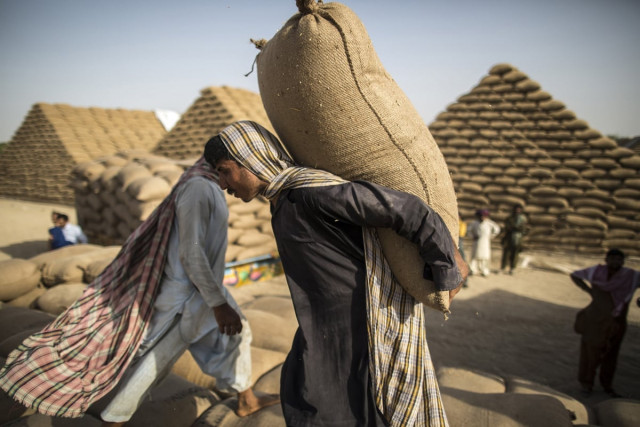Flawed policy: Cheaper wheat imports lead to hefty loss
Millers purchase commodity from Russia despite surplus stock in country.

According to officials, the government should have clearly defined export and import policy while keeping in view the stocks and upcoming wheat crop. PHOTO: REUTERS
According to officials, the government should have clearly defined export and import policy while keeping in view the stocks and upcoming wheat crop. However, no such step was undertaken and this provided the flour millers an opportunity to manipulate the market.
It was brought to the attention of the Economic Coordination Committee (ECC) in its meeting held on January 23 that the Pakistan Flour Mills Association – Sindh zone had imported 611,000 tons of wheat from Russia at a cheaper rate.
Owing to abundant stocks with the flour millers, they were not purchasing wheat from government reserves.

The chief minister of Sindh had also requested the prime minister to allow export of 660,000 tons of wheat at a subsidy of $50 per ton to dispose of old stock.
The officials pointed out that wheat import by flour millers forced Sindh to make exports in a bid to save growers from manipulation at the hands of millers in the new harvesting season.
“However, the ECC allowed export of 400,000 tons to the Sindh government at a rebate of $45 per ton, causing a burden of $18 million on the national exchequer,” an official said.
To Punjab government, the ECC allowed export of 800,000 tons at a rebate of $55 per ton, resulting in a burden of $44 million.
“The surplus stock of Punjab could be used for Sindh if there had been no imports by the millers,” the official said.
The ECC was informed that provinces and Pakistan Agriculture Storage and Services Corporation (Passco) had requested earlier for the export of 3 million tons of wheat at a discounted rate in a meeting held on December 23, 2014.
Punjab and Sindh had procured 3.74 and 1.21 million tons of wheat respectively. With a carryover stock of 135,000 tons and 6,000 tons, Punjab and Sindh started the year 2014-15 with stocks of 3.88 million and 1.28 million tons respectively.
Owing to the good crop, the private sector also purchased huge stocks directly from the growers.
With the procurement cost at around $380 per ton, the provinces wanted to export their stocks at a rebate of $50 to $70 per ton.
It had been noted that the price in the international market had dropped significantly. Australian soft wheat, which is comparable to Pakistani wheat in quality, was being sold at $270 per ton. Indian wheat was also available at around $270 per ton.
Published in The Express Tribune, January 30th, 2015.
Like Business on Facebook, follow @TribuneBiz on Twitter to stay informed and join in the conversation.



















COMMENTS
Comments are moderated and generally will be posted if they are on-topic and not abusive.
For more information, please see our Comments FAQ